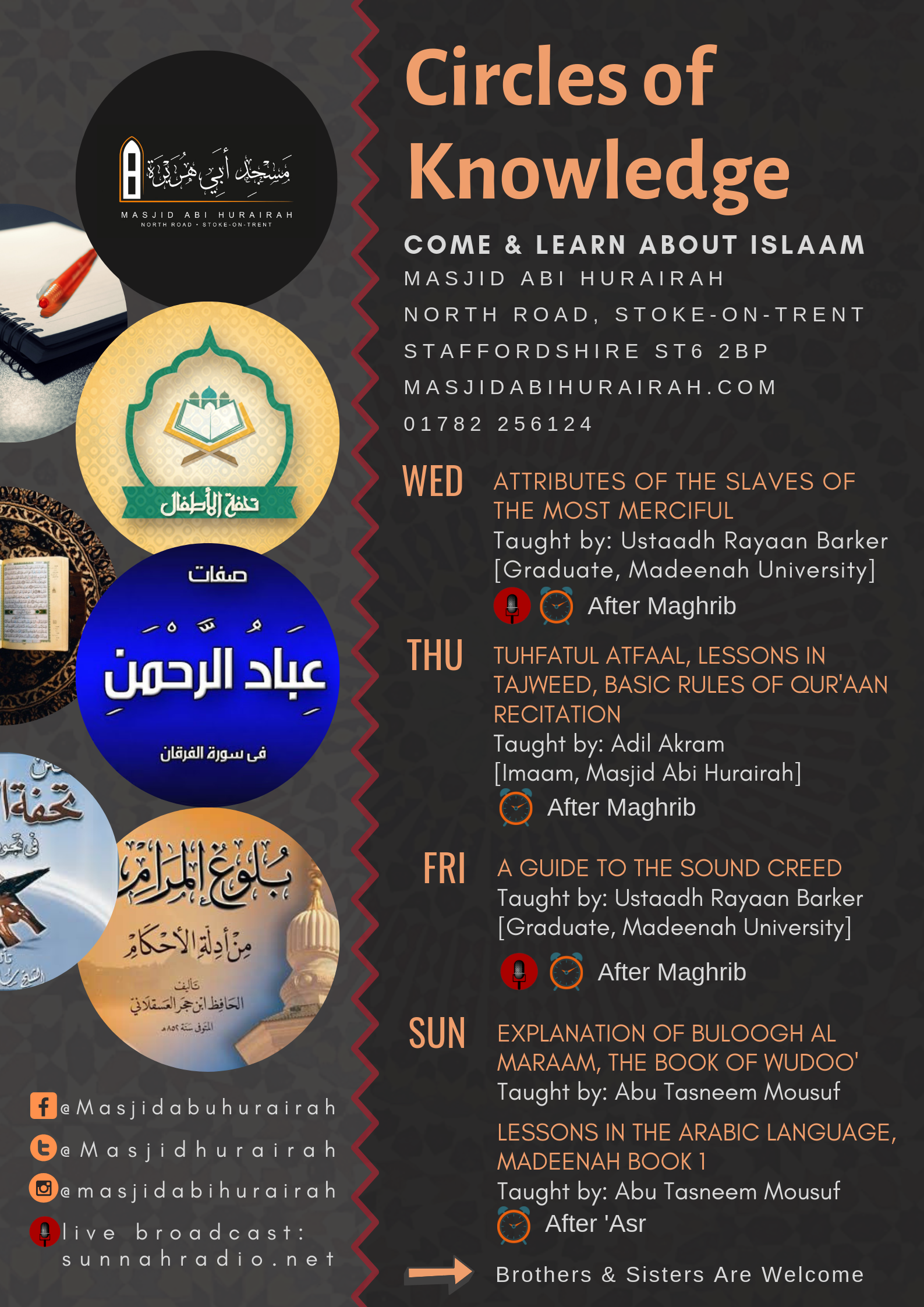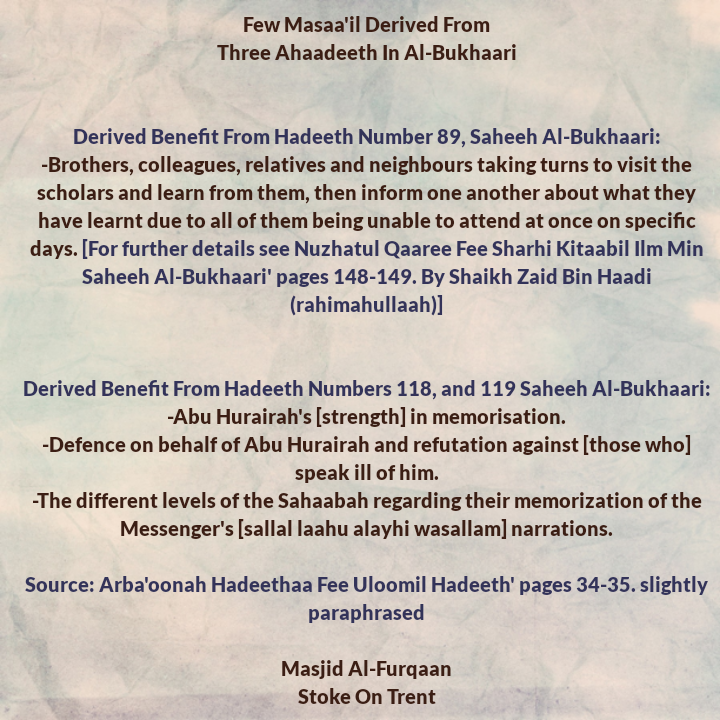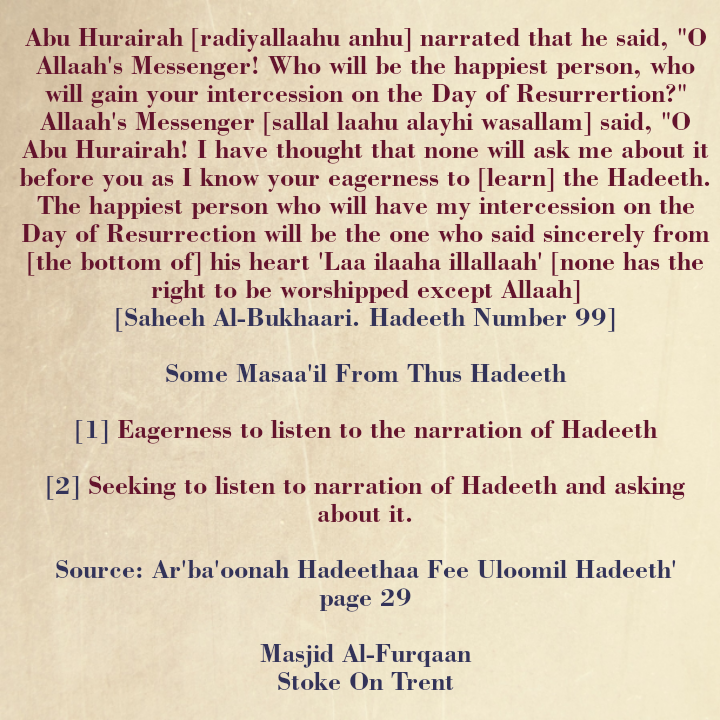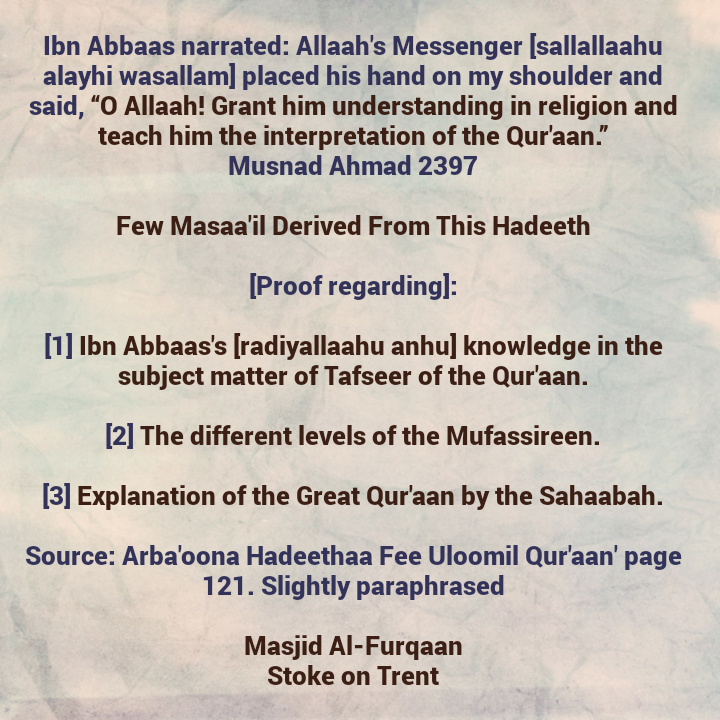In The Name of Allaah, The Most Merciful, The Bestower of Mercy.
We have witnessed – in the past – when some Trustees of Masaajid and Centres strayed from the right path – either became engrossed in Admin Issues and their Dunya Affairs at the expense of Ilm and sound understanding, emotionally captured by the mention of their Early Achievements, or they stagnated and became obstacles for some time whilst The Upright Scholars and Students dealt with a new category of people who attempted to defile the Salafi Manhaj with Ghuluww, such as the likes of Al-Hajooree, and the proponents of Tamyee, such as the likes of Al-Maribi.
If Maintainers of Maraakiz are not from The Asaateedh – Those Who Prepare and Deliver Lessons, then what excuse can we give for being constantly absent from those lessons we arrange for our communities?! Rather, we should be the first to attend those lessons and being consistent. Likewise, the recognised Tullaabul Ilm have a great responsibility to teach the people, because when there is a prolonged absence of Ilm and fitna suddenly occurs, many people fall into error; but when the local Tullaabul Ilm are active in nurturing the community upon sound Aqeedah and Manhaj, connecting with the other Maraakiz and elder teachers, then indeed – after the Tawfeeq of Allaah, we find the people being well-informed and alert, ready to listen and understand the Tawjeehaat of the scholars and the elder students. Let not any Taalibul Ilm be complacent regarding the respect he receives from the people, because we have witnessed – many times – that when people carry shubuhaat and are convinced by the deviants, then indeed that respect they have for you disappears, and thus you find yourself in greater difficulty whilst seeking to give clarifications; therefore nurture the people regularly by way of constant duroos and sittings, so that they are well informed and alert. Let us not be complacent as Shaikh Rabee [may Allaah preserve him] stated, “It is obligated on the people of truth to exercise patience and increase in adhering to this religion of truth. Whenever the desires become abundant, it becomes necessary to increase in acquainting (oneself) with the truth and adhering to it, as the Messenger (alayhis salaatu was-salaam) said: ‘The one who lives long amongst you will see a lot of differences, so upon you is that you follow my Sunnah and the Sunnah of the rightly guided khulafaa. Bite onto it with your molar teeth (i.e. hold onto it firmly) and beware of newly invented matters (in the religion), for every newly invented matter (in the religion) is a bidah and every bidah is misguidance'”.
[Majmoo 14/294 (3rd paragraph)]
Likewise, we are well aware of the statement of Imaam Ibnul Qayyim [rahimahullaah] regarding the virtue of those who know the religion in detail. Imaam Ibnul Qayyim [reahimahullaah] said:
Allaah [The Most High] said:[ وَكَذَٲلِكَ نُفَصِّلُ ٱلۡأَيَـٰتِ وَلِتَسۡتَبِينَ سَبِيلُ ٱلۡمُجۡرِمِينَ – And thus do We explain the Ayat (proofs, evidences, verses, lessons, signs, revelations, etc.) in detail, so that the way of the Mujrimun (criminals, polytheists, sinners) become manifest. [Surah Al-An’aam. Aayah 55]
Those who know Allaah, His Book and His Religion are acquainted with the path of the believers and that of the criminals in detail- the two paths are clearly visible to them, just as a path leading to its destination and the path leading to destruction are made clearly visible. They are the most knowledgeable amongst the creation- the ones who benefit [the people] the most, the ones with the most useful advice and they are an evidence of right guidance. This is why the Sahaabah have excelled all those to come after them until the Day of Judgment, for indeed they were brought up upon the path of misguidance, shirk and paths leading to destruction, and they knew them in detail; then the Messenger [sallal-laahu-alayhi-wasallam] came to them and took them out from darkness [an entered them] into complete light- from shirk into Tawheed; from ignorance into knowledge; from misguidance into guidance; from injustice into justice; from confusion and blindness into guidance and clear-sightedness. They knew the worth of that which they received and were triumphant by way of it. [They knew the worth] of that which was contained in what they [received], since what is in opposition to the [truth and right guidance] reveals the goodness of what it opposes, because [upright] affairs are made clear by way of their opposites. So they increased in desire and love of that which they embraced, disliked and hated that which they had turned away from. And of all the people, they had the most love for Tawheed, Imaan and Islaam, and had the most hatred for that which was in opposition to it. They were the most knowledgeable of the path in detail.
As for those who came after the Sahaabah, amongst them is that one who was brought up in Islaam but knows not what is in opposition to it. Therefore, some of the details of the path of the believers and that of the criminals became confusing to him, for indeed confusion occurs due to the weakness of one’s knowledge regarding both paths or one of them, as Umar Ibnul Khattaab [radiyallaahu-anhu] said: “The bonds of Islaam will be undone one after the other when a people who grew up in Islaam know not what Jaahiliyyah [Pre-Islamic Ignorance] is.’’ This [statement shows an aspect of] Umar’s perfect knowledge [of Islaam].
And there is that one who is neither acquainted with the path of the criminals nor has it been made clear to him, or he has doubts and thus thinks that some of their ways are from the ways of the believers. This has occurred in this Ummah in many affairs of Aqeedah, Knowledge and Action regarding the path of the criminals, the disbelievers and the enemies of the Messengers, [which] was brought into the path of the believers by the one who does not know the [detailed distinction between] the path of believers and the path of the criminals, so he called to [this path], excommunicate the one in opposition and declares lawful that which Allaah and His Messenger made unlawful, just as what has occurred with many of the people of bidah, such as the Jahmiyyah, the Qadariyyah, the Khawaarij, the Rawaafid and their ilk- among those who initiated an innovation, called to it and excommunicated those who opposed it.
The people are four categories in this subject matter [i.e. the obligation of having knowledge of the path of the believers and that of the criminals in detail].
The First Group: They are those who know the path of the believers and that of the criminals in detail-in both knowledge and action. They are the most knowledgeable amongst the creation.
The Second Group: They are those who are blind to both paths- those resembling animals. The path of the criminals comes [to them] and they follow it.
The Third Group: It is that one who concerns himself with (seeking) knowledge of the path of the believers and not its opposite. He only knows (the path of the criminals) by way of its opposition to the (path of the believers) and in a general way, and [holds] that all that is in opposition to the path of the believers is falsehood, even though that is not illustrated to him in detail. Rather, when he hears some of that which contradicts the path of the believers, he turns away and does not preoccupy himself in understanding and knowing its falsity. This person is in a state (similar) to one who is safeguarded from following desires- whose heart is neither put at risk nor is he called to (such desires), as opposed to those who are aware of (such desires) and their souls are inclined towards them, but they strive against it for the Sake of Allaah. A letter was written to Umar Ibnul Khattaab (radiyallaahu-anhu) and he was asked about this affair, as to which of the two men is the better- a man who is not put at risk by way of desires and does not go through its difficulties, or a man who is pushed towards it but abandons it for the Sake of Allaah? Umar (radiyallaahu-anhu) wrote back saying: The one who is desirous of sin but abandons it for the Sake of Allaah is from ‘those whose hearts Allaah has tested for piety. For them there is forgiveness and a great reward.’ [Surah Hujuraat. Ayah: 3]
The Fourth Group: This group knows the path of evil, bidah and kufr in detail and the path of the believers in general. This is the situation of many of those who concern themselves with the beliefs of the previous nations and that of the people of bidah. They are acquainted with (these affairs) in detail, but not with what the Messenger (sallal-laahu-alayhi-wasallam) came with; rather they are acquainted with it in general even though they may know some of its affairs in detail. Whoever examines their books will see that. Likewise, those who know the paths of evil, oppression and corruption in detail and are followers of it; if they repent, abandon these (affairs) and return to the path of the pious believers, then their knowledge of it will only be general. They will not be acquainted with it in that detailed manner known to those who spend their lives (studying) its regulations and ways.
The Objective: Indeed, Allaah (Glorified be He) loves that one should know the path of His enemies in order to avoid and hate it, just as the path of the His awliyaa (close friends) is known and followed. [An Excerpt from ‘Al-Fawaa’d pages 167-180’. slightly paraphrased]
Finally, we ask Allaah to make us sincere and upright, act upon what we learn and overlook our shortcomings Aameen. And we remind the local Tullaabul Ilm regarding the following admonition by Shaikh Saaleh Aala Ash-Shaikh [hafidhahullaah]. [This Is Not An Era of Relaxation, Sleep And Amusement!
https://salaficentre.com/2020/08/01/this-is-not-an-era-of-relaxation-sleep-and-amusement-a-brief-and-powerful-reminder-to-students-of-knowledge-by-shaikh-saaleh-aala-ash-shaikh/









